
The result of CSIRO’s latest culture survey shows a snapshot of a workforce struggling with low morale, lacking confidence in the organisation’s strategic direction and still reeling from the impact of hundreds of job cuts to support roles.
That sentiment is unlikely to improve in the near future, with the widespread expectation of further job losses, this time to research positions.
Chief Executive Doug Hilton did his best to brighten the lacklustre results.
“The results show that we have some clear strengths… many of you see CSIRO as a safe place to work, feel proud to work here and have a strong understanding of our values.
“At the same time, there are areas where we can improve, such as how clearly we articulate and align to our strategic direction, how we do organisational change and how we consistently act in line with our values,” Dr Hilton said.
So, what did the Pulse Survey results reveal?
Overall participation is only two-thirds (66 per cent) of staff and other eligible affiliates. That’s actually not too good, any lower would pose questions about engagement and raise questions whether the turnout constituted a representative sample.
Apart from Safety (86) and Employee Engagement (69) these results show CSIRO struggling to reach a clear majority (two-thirds) for Strategic Direction (62) and Psychological Safety (61).
CSIRO just scrapes through with a simple majority for Collaboration (54) and CSIRO Values (53), but can’t even reach parity for Leaders (48) and Change (32).
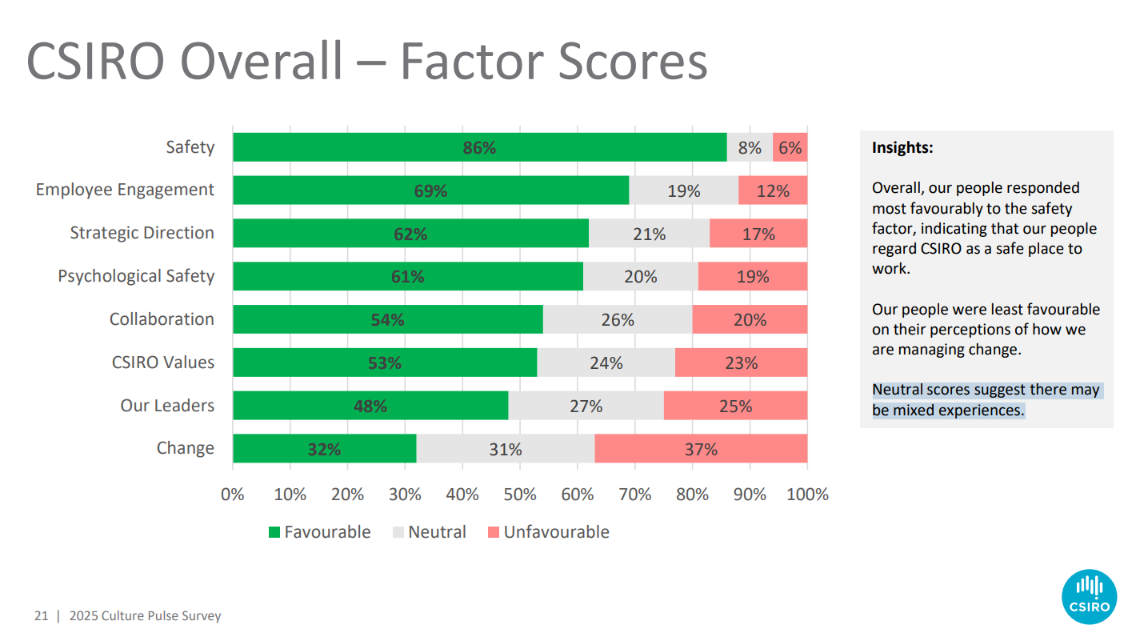
There’s also a significant 25-percentage point gap between Safety (86) Psychological Safety (61).
With masterful understatement, the report’s author suggest that ‘neutral scores suggest there may be mixed experiences.’
The overall results for Strategic Direction (62) is… not great.
Staff understanding of Strategic Priorities (53) is poor. Put another way, 48 per cent of respondents don’t understand or don’t agree with the priorities set by Executive.
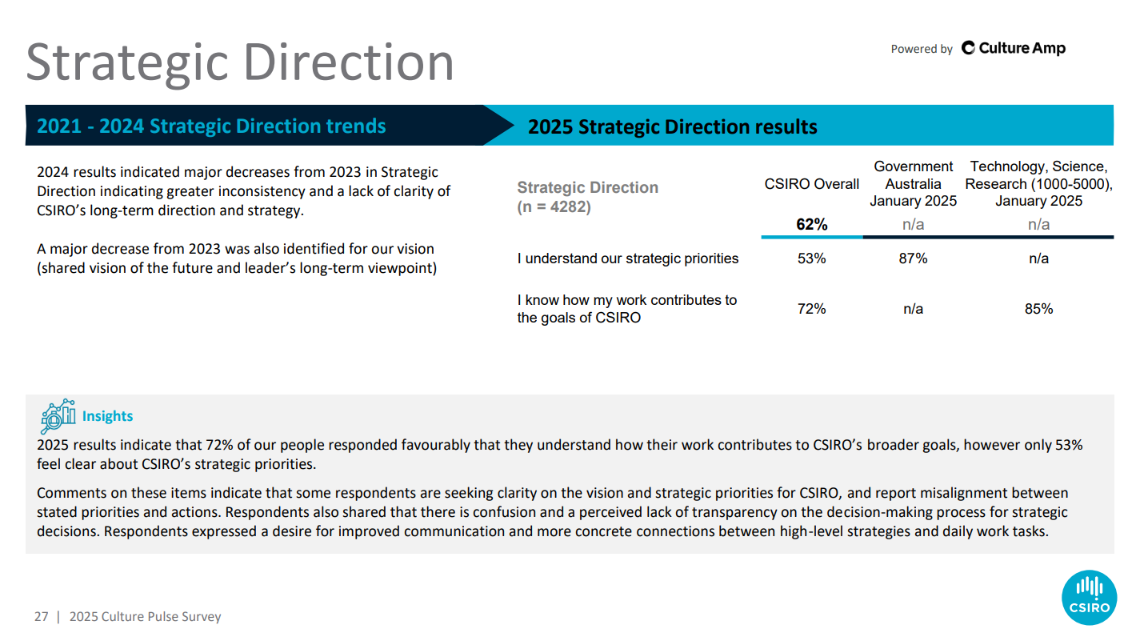
However, that sense of staff contribution to CSIRO broader goals (72) remains strong.
Staff know what CSIRO Values are (84) and likely identify. But exactly half (50) cannot endorse the statement that corporate values (defined by the current Executive) match actual CSIRO effort and work.
More than a clear majority (74) do not agree there is any accountability for those that ignore CSIRO Values and that may very well speak to a larger sense of workplace injustice.
Let’s consider the CSIRO workforce’s confidence in organisational leadership, starting with the good. Most staff (70) still feel that Direct Line Managers have their back.
However, that falls away sharply as we go up the pecking order. Research/Business Unit leaders can barely muster a pass mark (52).
Still, that’s a lot better than Executive. Approximately only a third of respondents rate the delivery (33) or ability to motivate (36), surely core competencies for senior leaders.
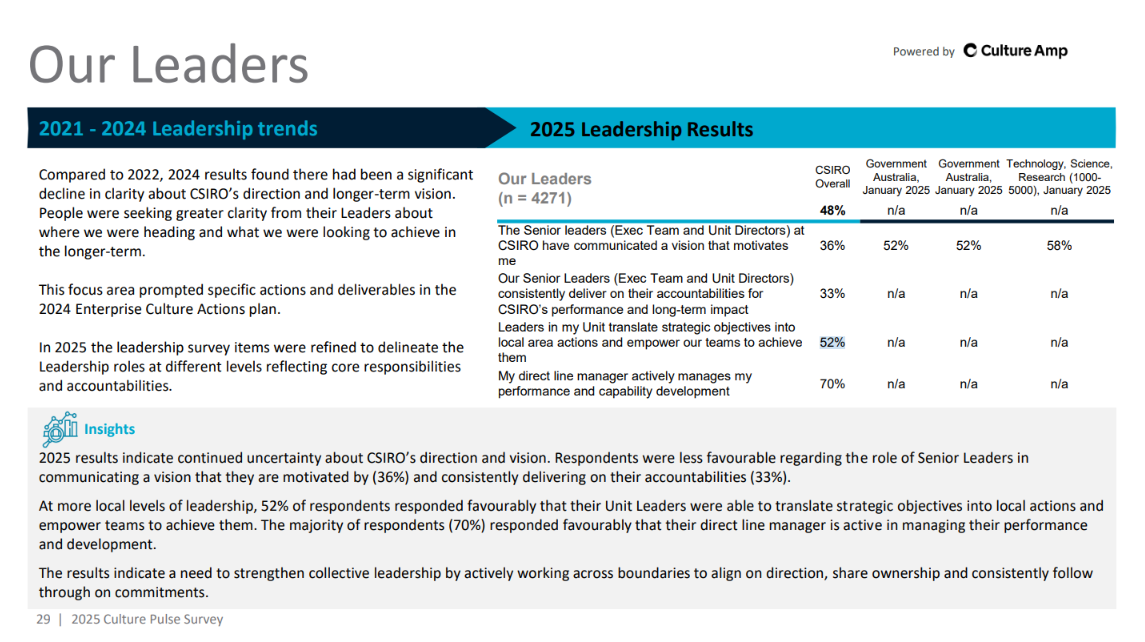
Barely a pass mark (54) for collaboration poor result (54) for a science agency that nominally values staff collegiality.
Half of staff (50) cannot agree that their own collaboration is recognised and less than sixty per cent (58) rate the organisations ability to internally collaborate and achieve outcomes.
The impact of heavy job cuts, writ large. A very, very poor result overall (32), worse for current capability (29) and scant faith (36) in the culture, mindset or resilience to adapt effectively.
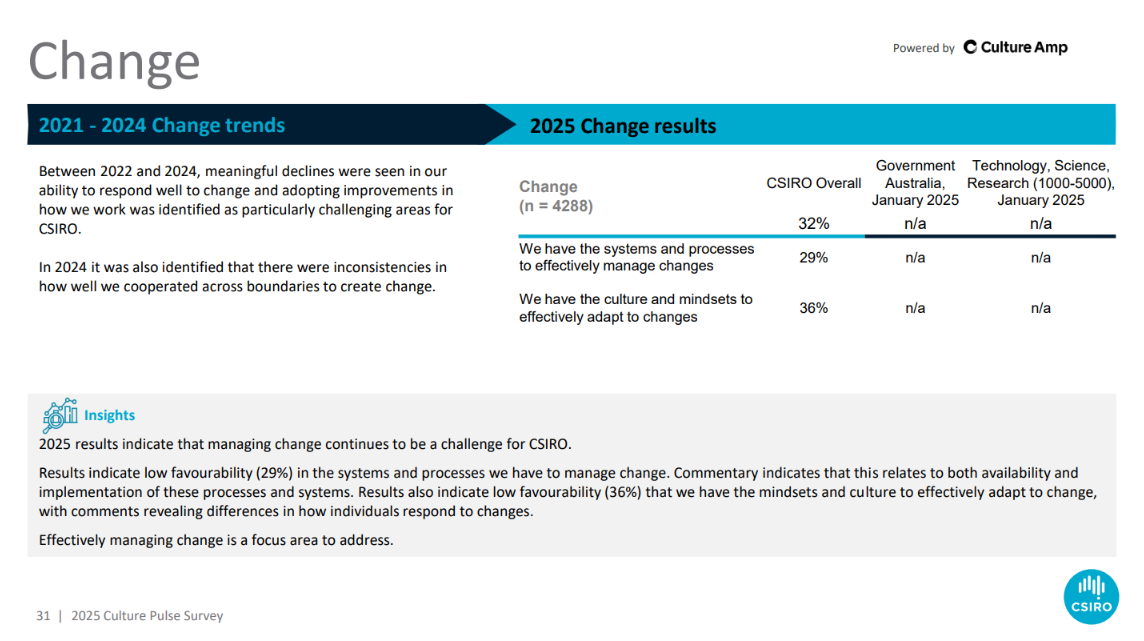
As noted previously, there is a 25-percentage point gap between Safety (86) Psychological Safety (61).
Many respondents (44) can’t agree or don’t know if they can avoid negative consequences for voicing contrary opinions… this from the storied workforce of an iconic research organisation.
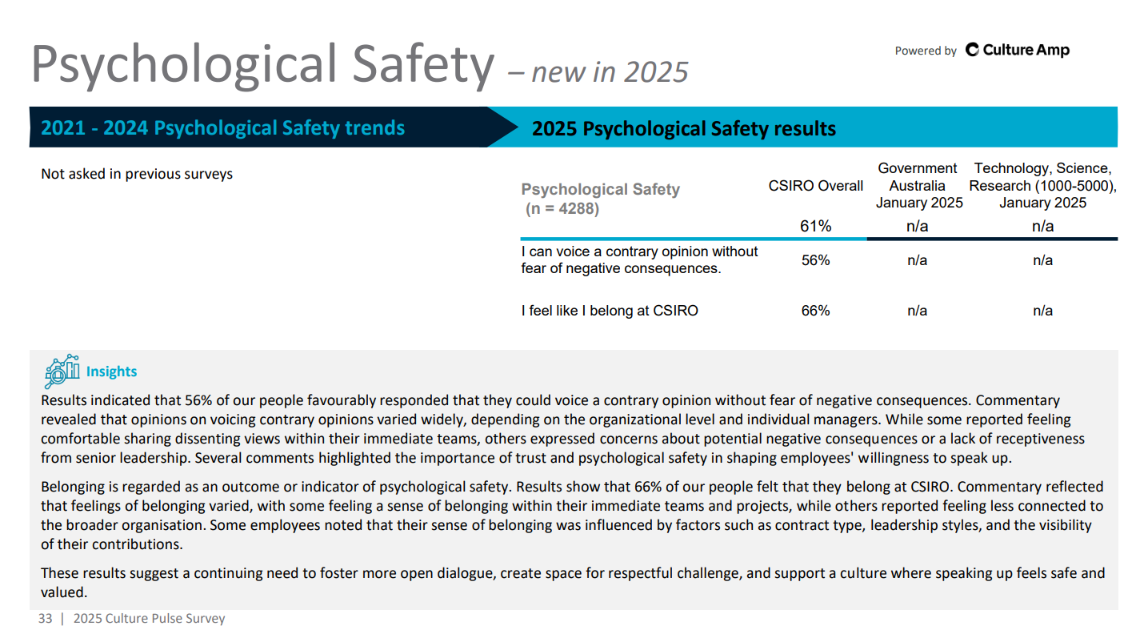
One third (33) of respondents can’t agree or don’t know if they belong at CSIRO. How did we get here?
Overall scores are good (69), ratings which are held up by workforce pride in CSIRO (82) which remains a positive recommendation for new staff as a great place to work (71).
Once you’re in though, it tends to get tougher. Only 52 per cent feel that CSIRO provides the motivation to go above and beyond what might be expected or possible elsewhere.
The report notes ‘a decline in pride, willingness to recommend, and motivation were noted due to frustrations with internal ways of working and the significant changes over the past year.’
As usual, a massive difference between the outlook of CSIRO Executive (heroic, incredibly positive) and everyone else (more realistic, Planet Earth).
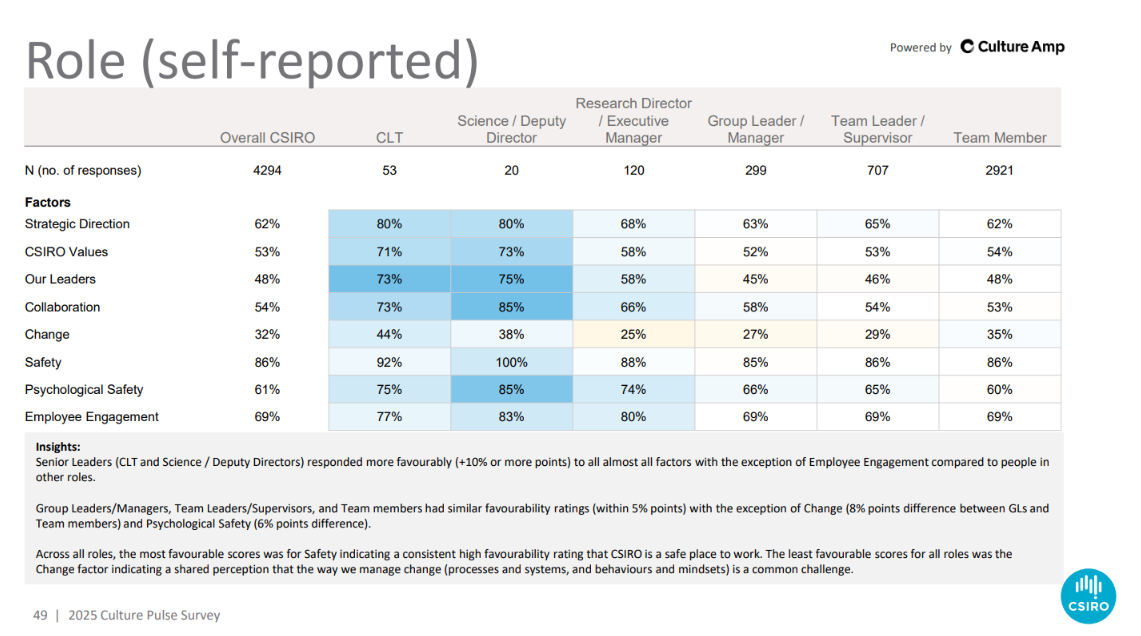
Interestingly, some of the lowest ratings on Change (systems, processes, culture and mindset to manage and adapt) are recorded by Research Directors/Executive Managers (only 25 per cent).
Survey shows CSIRO job cuts shake staff confidence in leaders – Canberra Times (text below)
—
Canberra Times, 11 August 2025
Confidence in senior leadership and their management of change is flagging at Australia’s key scientific research agency, after hundreds of job cuts and concerns about more to come.
Staff survey results for the Commonwealth Scientific and Industrial Research Organisation (CSIRO) show only 36 per cent of staff believe the senior executives are communicating a motivational vision for the agency.
The survey of 4294 staff, conducted between May 6 and May 20, 2025, also showed that just one-third of staff thought senior leaders consistently delivered on their accountabilities for CSIRO’s performance.
The message from staff comes about a year after senior leadership announced up to 500 jobs could be cut in response to budgetary pressures.
About 440 positions have been axed to date, the main public sector union says, largely from the agency’s enterprise services division, which includes jobs in IT, HR, communications, business development, facilities management and finance.
Susan Tonks, the Community and Public Sector Union representative for the CSIRO staff association, said survey results had been trending “in the wrong direction” since 2024.
“It indicates that there’s something really wrong there in how it’s all being communicated, and people understanding where it’s going or the direction coming from senior leaders,” Ms Tonks said.
The report, prepared for CSIRO by private firm Culture Amp, noted that job security and morale were key concerns for staff who provided written feedback.
“Employee comments show concerns regarding leadership accountability, a perceived lack of transparency in decision-making processes, and the negative impact of recent restructuring initiatives on staff morale and job security,” the summary reads.
“Many comments highlight excessive workloads, bureaucratic processes, and a perceived lack of support for collaboration across teams and units.
“Recurring themes include concerns about inconsistent application of policies, inadequate performance management, and a desire for improved communication.”
Staff’s understanding of CSIRO’s strategic direction has also been falling since 2024, with a little more than half of respondents saying they understood the agency’s strategic priorities (53 per cent).
The report identifies “meaningful declines” in attitudes to change management between 2022 and 2024, with only 29 per cent of staff confident the agency has the systems and processes to effectively manage change in 2025.
There were 36 per cent who said CSIRO had the culture and mindsets to effectively adapt to changes.
Other measures showed a more positive picture of the agency, with 86 per cent of staff considering it a safe place to work and 71 per cent recommending it as a great place to work.
CSIRO chief executive Doug Hilton told staff the agency had listened to them on “both the strengths and the areas that need greater attention”.
“Your voice through this survey is part of how we listen and learn, and we are committed to acting on what you have shared,” his foreword on the report reads.
While job cuts have been targeted mostly at the enterprise services division, Ms Tonks said there was a general anxiety in the agency that more cuts would need to be made.
The union has shifted its attention from senior leadership to the Albanese government, calling for more resources for the agency.
“If the government’s serious about lifting productivity, they need to commit to the long-term stability of CSIRO,” Ms Tonks said.
“It’s our national science agency, it’s the very institution that actually does lift productivity.”
In a statement last week on the job cuts, CSIRO said it was “reshaping its research portfolio” to refine its focus.
“As we continue to evolve our portfolio, we will undertake workforce planning to ensure we have the right scale and scientific capability in place to deliver against national priorities,” a spokesperson for the agency said.
“This will be done in line with well-established processes, policies and our enterprise agreement, including our commitment to consult with staff prior to decisions being made.”
.